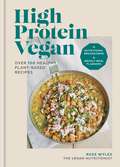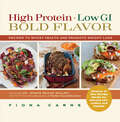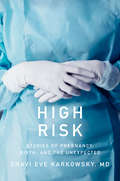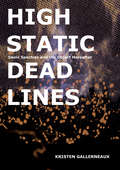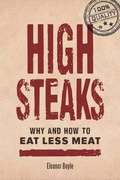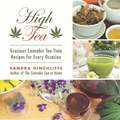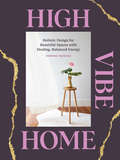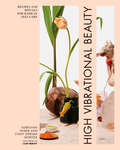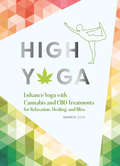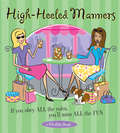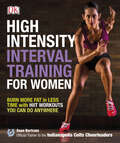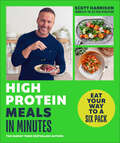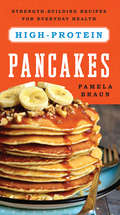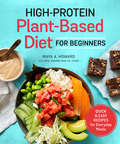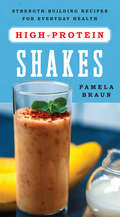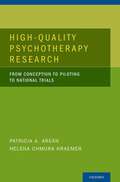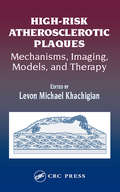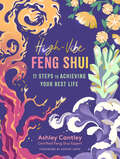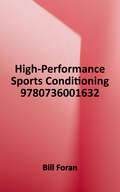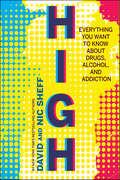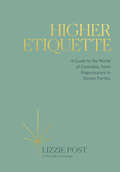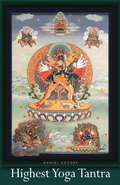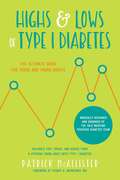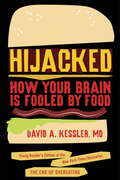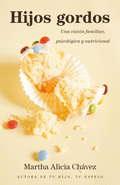- Table View
- List View
High Protein Vegan: Over 100 healthy plant-based recipes
by Rose WylesGive your body the boost it needs with over 100 high-protein vegan recipesWith a plant-based diet, it is essential to ensure you are consuming enough protein. Inside this cookbook, you will find over 100 tasty and healthy high-protein meals for every time of day.Qualified plant-based nutritionist Rose Wyles offers expert advice on the ideal protein intake and how to effortlessly boost the protein count of vegan dishes. Complete with calorie-counted recipes, full nutritional breakdowns and meal planners, High Protein Vegan will help you fuel your body with nourishing, nutritious recipes.CONTENTS INCLUDE:Power BreakfastsChickpea & spinach omelette; Plant-based sausage & sweet potato hash; Toffee & banana pancakesSnacks & Quick BitesCheat's pepper pizza; Griddled Greek-style sandwiches; Double-berry muffinsEnergising LunchesMarinated tofu with vegetables; Chilli & courgette penne; Quick quesadillasDelicious DinnersLentil bolognese; Spicy chickpea curry; Meat-free cottage pieTasty Sweet TreatsChilli chocolate chip cakes; Peanut butter cookies; Warm pecan caramel cupcakes
High Protein, Low GI, Bold Flavor: Recipes To Boost Health And Promote Weight Loss
by Fiona CarnsNearly 100 boldly flavored recipes featuring lean proteins and health-promoting, low-GI carbs—nutritious meals designed for family eating, every day Here is boldly flavored, nutritious food at the leading edge of the dietary curve. Inspired by her long-standing interest in highly nutritious, waistline-friendly eating, caterer and cookbook author Fiona Carns developed the high-protein, low-GI eating regimen showcased here. High-quality, high-protein ingredients (including lean meats and fish) fill you up without the fat—while low-GI fruits, vegetables, and grains keep you going without blood glucose spikes. Here are dozens of one-recipe meals for breakfast, lunch, and dinner that use minimally processed ingredients (but which are easy enough for everyday cooking)—plus 18 complementary sides and a half-dozen lowfat, low-GI desserts—food that is perfectly suited to our times.
High Risk: A Doctor's Notes On Pregnancy, Birth, And The Unexpected
by Chavi Eve Karkowsky MDA doctor’s revelatory account of pregnancy and the complexity of reproductive life—and everything we lose when we don’t speak honestly about women’s health. “My work offers a window into the darkest and lightest corners of people’s lives, into the extremes of human experience,” writes Dr. Chavi Eve Karkowsky in High Risk, her timely and unflinching account of working in maternal-fetal medicine—that branch of medicine that concerns high-risk pregnancies. Whether offering insight into the rise in home births, the alarming rise in America’s maternal mortality rate, or the history of involuntary sterilization, Karkowsky offers a window into all that pregnancy, labor, and birth can entail—birth and joy, but also challenge and loss—illustrating the complexity of reproductive life and the systems that surround it. With historical insight and journalistic verve, Karkowsky unpacks what is involved for women, for a family, and for us as a society; and explores what’s at risk when these aspects of medicine remain clouded in mystery and misinformation.
High Static, Dead Lines: Sonic Spectres & the Object Hereafter
by Kristen GallerneauxA literary mix tape that explores the entwined boundaries between sound, material culture, landscape and esoteric belief.Trees rigged up to the wireless radio heavens. A fax machine used to decode the language of hurricanes. A broadcast ghost that hijacked a television station to terrorize a city. A failed computer factory in the desert with a slap-back echo resounding into ruin.In High Static, Dead Lines, media historian and artist Kristen Gallerneaux weaves a literary mix tape that explores the entwined boundaries between sound, material culture, landscape, and esoteric belief. Essays and fictocritical interludes are arranged to evoke a network of ley lines for the &“sonic spectre&” to travel through—a hypothetical presence that manifests itself as an invisible layer of noise alongside the conventional histories of technological artifacts.The objects and stories within span from the mid-nineteenth century to the present day, touching upon military, communications, and cultural history. A connective thread is the recurring presence of sound—audible, self-generative, and remembered—charting the contentious sonic histories of paranormal culture.
High Steaks
by Eleanor BoyleEach year the average North American ingests well over two hundred pounds of animal protein. Meanwhile the global appetite for meat has increased dramatically. But feeding our meat addiction comes at tremendous cost. Maintaining our current level of consumption is ecologically impossible in the longterm and undermines our personal health and community well-being.High Steaks documents the disastrous consequences of modern large-scale industrial meat production and excessive consumption, including:*The loss of vast tracts of arable land and fresh water to intensive livestock production*Increased pollution, loss of biodiversity, deforestation, and accelerating climate change*The environmental and health impacts of too much animal fat, and of antibiotics and other chemicals in our food.Timely and compelling, this powerful book offers a modest, commonsense approach to a serious problem, suggesting strategies for all of us to cut back on our consumption of animal products and ensure that the meat we do consume is produced in a sustainable, ecologically responsible manner. At the same time, High Steaks describes progressive food policy shifts that will discourage factory farming and encourage people to eat in ways that support ecosystems and personal health.Eleanor Boyle has been teaching and writing for twenty-five years, with a focus on food systems and their social, environmental, and health consequences. As well as working with organizations aiming for better food policy, she holds an MSc in food policy and is an instructor at the Centre for Sustainability at the University of British Columbia.
High Tea: Gracious Cannabis Tea-Time Recipes for Every Occasion
by Sandra HinchliffeWith High Tea, author Sandra Hinchliffe writes a totally new chapter in tea culture and the culinary art of cannabis cuisine. Teas, tisanes, broths, and bhangs are all exquisite ways to infuse marijuana for medicine or pleasure. With more than seventy-five recipes using a fascinating array of the finest teas, herbs, and ingredients, High Tea will show you how to create sensational flavors, select moods, and serve all of the good vibrations the cannabis plant has to offer: • Learn the methods of serving moderate doses of cannabinoids like THC with a fast onset to ensure a therapeutic and enjoyable experience for both the cannabis novice and the experienced connoisseur. • Discover the magic of the terpene entourage for cannabis tea, tisane, and broth: Turn on, taste it, drop in, and welcome back the fragrance, flavor, and vibes that you’ve been missing. • Delight your guests with creamy bhangs and cannabis chai—perfect for a holiday celebration or any occasion. Everyone will enjoy the savory and sweet bites from Sandra’s sensitivity kitchen to quell the munchies. In addition, High Tea also includes a selection of simple, fresh, and elegant fare to pair with your tea-time, anytime!
High Vibe Home: Holistic Design for Beautiful Spaces with Healing, Balanced Energy
by Kirsten YadougaFrom an interior designer and modern feng shui expert, High Vibe Home is a luxe handbook for creating restorative spaces that feel as good as they look.Create a home that feels as good as it looks. From an interior designer and energy practitioner, High Vibe Home teaches readers how to design harmonious spaces that invite free-flowing, positive energy into their homes and lives. By decluttering and cleaning, arranging furniture, decorating with crystals or houseplants, incorporating new colors, textures, and more, anyone, on any budget, can design a home with high vibes. The book outlines key design principles and energy rules that contribute to a nourishing home, and then, room-by-room, offers achievable ways to put those practices into place. In a luxe package, this handbook is woven through with atmospheric photography, evocative shots of styled decor elements, and helpful diagrams. High Vibe Home is a must-have for design aficionados, wellness enthusiasts, and anyone interested in crystals, feng shui, or energy work. Alongside smudge sticks or a cozy throw, it's a thoughtful gift for a girlfriend's birthday or a housewarming party.ACCESSIBLE PRACTICES: High Vibe Home offers achievable, affordable practices to make spaces feel more Zen. Anyone, on any budget, can make these small adjustments to improve their home and in turn, channel that newfound positive energy into other areas of their life.MORE THAN JUST HOME DECOR: This book is not simply a collection of design tips; it also teaches how to foster specific types of energy in your space—calming, invigorating, healing, etc. These choices can have an outsize impact on not just your mood but also your relationships, career, and health.ON TREND: The wellness trend is still going strong, and holistic interior design is an extension of that. There are sections throughout the book on crystals, chakras, feng shui, and other types of energy work, which will appeal to those interested in these on-trend wellness topics.Perfect for:• Anyone looking for ways to make their home lovelier or more Zen• People interested in energy work, crystals, or feng shui• Shoppers looking for a Mother's Day, hostess, or housewarming gift
High Vibrational Beauty: Recipes & Rituals for Radical Self Care
by Kerrilynn Pamer Cindy Diprima MorisseBeauty is Wellness. Wellness is Beauty.Kerrilynn Pamer and Cindy DiPrima Morisse, founders of CAP Beauty, the all-natural beauty site and store, want to share their deep knowledge of the benefits of natural beauty, foods, and mindfulness techniques with you. Natural beauty is about making choices that create true radiance from the foods we eat to the way we move to how we care for ourselves and our planet.You’ve already purified your meals, workouts, and bodies by returning to clean naturals. Now it’s time to align your beauty routine with the other wellness practices you follow. What we put on our skin is easily as important as what we put in our mouths. But natural beauty is about much more than just products. Through routines, recipes, and rituals, High Vibrational Beauty addresses beauty from the inside out and vibrancy from the outside in.Divided into seasons and focused on self-care and rejuvenation, High Vibrational Beauty combines mantras, meditations, natural skin care regimens, and more than 100 plant-based recipes to help you achieve radical radiance. This is the only guidebook you need to create true and lasting beauty for the mind, body, and soul.
High Yoga: Enhance Yoga with Cannabis and CBD Treatments for Relaxation, Healing, and Bliss
by Darren ZeerYogis have been using marijuana to enhance yoga practice for centuries. In this all-levels handbook, expert yoga instructor Darrin Zeer distills this ancient practice for a modern audience, guiding readers on combining yoga and marijuana for a healing and blissful practice. Simple-to-follow instructions and illustrations for each pose are presented alongside weed strain recommendations, tips for safe consumption, and therapeutic benefits, including clarity, relaxation, and stress relief. Inviting, encouraging, and accessible to all yogis, from those just getting started on the mat to seasoned practitioners looking to enrich their practice, High Yoga makes it easy to relax the mind, ease the body, and lift the spirit.
High-Heeled Manners
by The Editors of Conari Press"We all are born charming, fresh, and spontaneous and must be civilized before we are fit to participate in society," according to American etiquette maven Miss Manners. And this is just the book to remind us what civilization looks like!
High-Intensity Interval Training for Women: Burn More Fat in Less Time with HIIT Workouts You Can Do Anywhere
by Sean BartramBurn fat, lose weight, and reach your fitness goals faster with high-intensity interval training! High-intensity interval training, or HIIT, is a fantastic way to lose weight and get strong by performing very short bursts of targeted exercise. The beauty of HIIT is that it works fast and the workouts are very short — which means you don't have to dedicate a lot of time to working out, but you&’ll still get great results. High-Intensity Interval Training for Women is a step-by-step, highly visual guide packed with exercises, workouts, and multi-day programs all tailored to help you reach your fitness goals, and help you do it in the time you have. Here&’s what you&’ll get with this complete guide: • 60 exercises that can be done anywhere and cover all the major muscle groups, with special emphasis on the core and lower body, where women often look for results first • Clear, step-by-step instructions and beautiful photography to illustrate every exercise • Over 45 routines designed for readers of all fitness levels, plus four multi-day challenges that range from three days all the way up to 28 days • Expert guidance how HIIT works, pre- and post-workout stretching, goal setting, and nutrition to help get you started and keep you on the right track to achieving your fitness goals If you're looking for an incredibly efficient and effective way to get strong and also get the body you want, then HIIT is your answer, and High-Intensity Interval Training for Women is the only guide you&’ll need!
High-Protein Meals in Minutes: Eat Your Way to a Six Pack
by Scott HarrisonScott Harrison, founder of The Six Pack Revolution, is back with his second book after the Sunday Times bestselling Eat Your Way to a Six Pack.With a focus on high protein meals, all able to be cooked in 30 minutes or less, this complete plan will have you eating and exercising your way to a six pack, with visible results in 75 days. Scott’s life-changing programme, The Six Pack Revolution has helped a community of tens of thousands of people across 57 countries gain confidence and achieve the best shape of their lives – all with no calorie counting or weighing scales in sight.
High-Protein Pancakes: Strength-Building Recipes for Everyday Health
by Pamela BraunGet stronger and stay satisfied longer with protein pancakes Athletes know how important protein is to a diet, which is why protein pancakes are the breakfast, lunch, dinner, and snack of choice for people who care about feeling—and looking—great. Easy to make and delicious to eat, protein pancakes have the same all-American taste of their carb-heavy counterparts, but are oh-so-much better for a body. With high-protein ingredients like quinoa, oatmeal, eggs, nuts, and various flours, more than 50 recipes include: Honey Banana Pancakes Dark Chocolate Pancakes Apple Cinnamon Pancakes Chai Pancakes Flip for protein, pancake-style.
High-Protein Plant-Based Diet for Beginners: Quick and Easy Recipes for Everyday Meals
by Maya A. HowardAn essential guide to optimal whole-food, plant-based protein sources, prep and cooking tips, and a 4-week meal plan for a manageable transition. Embarking on their journey, people who are beginners to plant-based eating often find themselves asking, "But where will I get my protein from now?" The simple answer is: from plants! Plants are optimal protein sources, and yes, it is entirely possible to get your daily protein requirements exclusively from plants. In High-Protein Plant-Based Diet for Beginners, wellness leader and coach Maya A. Howard offers an invaluable guide that breaks down which plants have the highest protein content, shows you how to combine ingredients for complete protein meals, and features delicious everyday recipes that use a variety of high-protein whole-food plants, like vegetables, grains, legumes, nuts, seeds, and even fruit! High-Protein Plant-Based Diet for Beginners features: • A beginner's guide to plant protein, including a handy chart showing the highest-protein plant foods and a short tutorial on how to pair ingredients for a complete protein meal. • Quick and easy recipes featuring high-protein options for every meal of the day (even snacks and desserts!), like Banana Oatmeal Bake, Sweet Potato Chia Pancakes, Chickpea Tortilla Soup, Kale Pesto Zucchini Linguini, Pineapple Fried Rice, Watermelon Poke Bowl, and Black Bean Fudge Brownies. • An easy-to-follow 4-week meal plan, complete with helpful grocery lists and step-by-step prepping instructions that takes the guesswork out of your first four weeks.
High-Protein Shakes: Strength-Building Recipes for Everyday Health
by Pamela BraunWith modern flavors and better texture, these are protein shakes everyone can love Protein is the magic bullet to staying lean and strong as we age. Time and again, studies show that eating more protein can help with weight loss, strength building, and energy. Protein shakes are a classic way to consume this important nutrient, but they often get a bad rap for being chalky and hard to swallow. Until now. Pamela Braun has developed recipes for modern and fresh shakes that taste great and truly satisfy. With high-protein ingredients like almond butter, coconut milk, hemp hearts, and yogurt, these shakes will please every taste and budget. More than 50 recipes include: Orange Cream Shake Mocha Shake Mexican Chocolate Shake Pumpkin Spice Shake Start living better and longer, one protein drink a day.
High-Quality Psychotherapy Research: From Conception to Piloting to National Trial
by Helena Chmura Kraemer Patricia A. Areanlthough psychotherapy research shares many of the same methodological issues that pharmacology trials do, psychotherapy research poses unique challenges, including the difficulty (if not near impossibility) of keeping participants blind to treatment assignment, the need for a replicable manual and therapist training procedure, the importance of outside observation of therapy quality ratings, and the problems researchers face in measuring the active ingredients of psychotherapy. High-Quality Psychotherapy Research is for all psychotherapy investigators who wish to learn state-of-the-art psychotherapy research methods. Organized developmentally, the book explains the conceptualization of the trial, discusses the pilot study and the large scale study, and concludes with instructions for designing a multi-site trial. Topics specific to psychotherapy research are examined in detail, including innovations in data analysis, how to conduct multi-site psychotherapy trials, mediation of treatment outcomes, the transportability of evidence-based behavioral interventions in community practice, training community providers to be study therapists, and recruiting hard-to-reach populations. High-Quality Psychotherapy Research is an informative, practical book appropriate for a broad range of readers, from junior investigators developing their first study idea to seasoned investigators who wish to take their research to a larger-scale level.
High-Risk Atherosclerotic Plaques: Mechanisms, Imaging, Models, and Therapy
by Levon Michael KhachigianVulnerable plaque development is the result of a complex series of molecular and cellular events involving inflammation, apoptosis, rupture, and thrombosis. A detailed understanding of the mechanisms underlying the development of high-risk plaques, along with the ability to visualize and diagnose these vulnerable lesions, will lead to the effective
High-Vibe Feng Shui: 11 Steps to Achieving Your Best Life
by Ashley CantleyThe keys to manifesting major life transformation are within reach! In this fresh interpretation of the ancient art of Feng Shui, certified practitioner Ashley Cantley offers the simple and straightforward guide she wishes she&’d had when she started learning about Feng Shui. Cantley&’s 11-step program demystifies foundational ideas and practices, with guided exercises for creating intention, tapping into intuition, cleaning and decluttering, and balancing and enhancing energy in your home. But this is no rule book! Cantley&’s process for eliminating blockages, realizing goals, and &“living in the flow&” is designed to be customized to anyone&’s desires, experiences, and style. This publication conforms to the EPUB Accessibility specification at WCAG 2.0 Level AA.
High-performance Sports Conditioning
by Bill ForanToday's athletes are breaking records that many thought were untouchable—in large part due to the major advances in sports training. High-Performance Sports Conditioning combines these superior modern methods with sample training programs, workouts, and drills to serve as the only conditioning guide you'll need this season. <p><p>This landmark book presents the principles and practices of this new era of athletic training in the most thorough and useful text ever of its kind. The first step in building a conditioning program is testing and building up the nine essential fitness components including power, strength, speed, quickness, coordination, agility, flexibility, local muscular endurance, and cardiovascular aerobic capacity and endurance. Next you tailor the training exercises and drills to the development of sport-specific performance factors. Then you periodize the training program precisely for peak performance at critical points in the competitive season, and if necessary, use a safe and effective reconditioning regimen to bring an athlete back from injury. <p><p>High-Performance Sports Conditioning brings together 22 of the finest and most respected contributors ever assembled for a sports conditioning guide. The strength and conditioning coaches for the Cleveland Indians, Vancouver Canucks, Miami Heat, Seattle Seahawks, Tampa Bay Mutiny, United States Olympic Training Center, and other top sports organizations share their best drills and workouts for developing full athletic potential in 11 sports. Internationally acclaimed experts such as Don Chu on power, Mark Verstegen on coordination and agility, and Tudor Bompa on periodization provide the very best information and insights in their respective areas of training. The revolutionary training system found in High-Performance Sports Conditioning reveals the future of athletic strength and conditioning and will be the training bible for coaches and athletes for many seasons to come.
High: Everything You Want to Know About Drugs, Alcohol, and Addiction
by David Sheff Nic SheffJust Say Know! With drug education for children more important than ever, this nonfiction book draws on the experiences of the NY Times bestselling father/son team of David and Nic Sheff to provide all the information teens and tweens need to know about drugs, alcohol, and addiction. From David Sheff, author of Beautiful Boy (2008), and Nic Sheff, author of Tweak: Growing Up on Methamphetamines (2008), comes the ultimate resource for learning about the realities of drugs and alcohol for middle grade readers. This book tells it as it is, with testimonials from peers who have been there and families who have lived through the addiction of a loved one, along with the cold, hard facts about what drugs and alcohol do to our bodies. From how to navigate peer pressure to outlets for stress to the potential consequences for experimenting, Nic and David Sheff lay out the facts so that middle grade readers can educate themselves.
Higher Etiquette: A Guide to the World of Cannabis, from Dispensaries to Dinner Parties
by Lizzie PostEmily Post has gone to pot.As we enter the dawn of a new "post-prohibition" era, the stigma surrounding cannabis use is fading, and the conversation about what it means to get high is changing. When it comes to being a respectful, thoughtful, and responsible consumer of pot, there is a lot you need to know. In Higher Etiquette, Lizzie Post--great-great granddaughter of Emily Post and co-president of America's most respected etiquette brand--explores and celebrates the wide world of legalized weed. Combining cannabis culture's long-established norms with the Emily Post Institute's tried-and-true principles, this book covers the social issues surrounding pot today, such as: * How to bring it to a dinner party or give it as a gift * Why eating it is different from inhaling it * How to respectfully use it as a guest * Why different strains affect you in different ways * How to be behave at a dispensary * How to tackle pot faux pas such as "canoed" joints and "lawn-mowed" bowlsThis handy guide also provides a primer on the diverse array of cannabis products and methods of use, illuminating the many convenient and accessible options available to everyone from experienced users to newbies and the canna-curious. Informative, charming, and stylishly illustrated, this buzzworthy book will make the ultimate lit addition to your stash.
Highest Yoga Tantra
by Daniel Cozort"This extraordinary book clearly outlines and discusses the methods for transforming both body and mind through the highest forms of tantric practice. Highest Yoga Tantra is the pinnacle of tantric systems found in the Tibetan Buddhist tradition. Part One discusses the practices common to sutra and tantra. Part Two presents the generation stage of Highest Yoga Tantra. Part Three covers the entirety of the completion stage yogas (i. e. , physical isolation, verbal isolation, mental isolation, illusory body, clear light, and union). Part Four compares the Kalachakra and Guhyasamaja stages of completion. Remarkable for its definitive clarity, this exposition of the stages of Highest Yoga Tantra is the first of its kind in the English language and a must for anyone interested in these highest tantras. "
Highs & Lows of Type 1 Diabetes: The Ultimate Guide for Teens and Young Adults
by Patrick McAllister Stuart AValuable tips, tricks, and advice from a veteran young adult with Type 1 diabetes. Type 1 diabetes (T1D) can be a daunting diagnosis, especially for a young kid or a teen. Patrick McAllister knows. Diagnosed with T1D at age twelve, McAllister’s life changed forever, and he faced an uncertain future of insulin shots, diet regulations, and high school. If only I had a roadmap, he thought. So, years after he learned things the hard way, he decided to write one.Whether it is managing mood swings, hormones, or blood sugar levels, Highs & Lows of Type 1 Diabetes is the ultimate teenager’s and young adult’s handbook for surviving, thriving, and flourishing with T1D during one of the most terrifying, yet exciting, phases of your life. Many think of T1D as a scary disease that is sporadic and uncontrollable, but after eight years of dealing with the literal and figurative highs and lows of T1D, McAllister has learned that it is more a lifestyle change. These pages detail a framework for every situation you could possibly imagine involving T1D, from coming home from the hospital after your diagnosis to preparing to leave your nest for freshman year at college. Learn how to:Count carbohydrates, pump insulin like a pro, and correct irregular blood sugar levelsTell your friends, get good grades, and survive schoolPlay sports with the right game-planNavigate sex, drugs, and rock ‘n’ rollAnd more!Type 1 diabetes stinks, but you don’t have to go through it blind and alone! Some have learned it the hard way, but Highs & Lows of Type 1 Diabetes will ensure that you will take control of your T1D diagnosis, conquer your adolescent years, and live a healthy and fulfilling life.
Hijacked
by David A. KesslerMost people believe that it's natural to gain a lot of weight as we get older. But this is not true. Kessler knows it's not true because until about 30 years ago, we did not have a weight problem in North America. In fact, throughout history, the human body weight stayed pretty much the same. People ate the amount of food they needed and no more. Then, in the 1980s, something changed. North Americans started gaining a lot of weight. What happened in such a short time to add so many millions of pounds to so many millions of people? Something had changed in North America, but it wasn't us. It was our food. These processed foods - loaded with sugar, fat, and salt - make it almost impossible for some people to stop eating. Many years ago, the food industry managed to figure out that they could sell more food if it had a lot of sugar, fat, and salt in it. Good food should make you feel full and satisfied. But foods that are high in sugar, fat, and salt have the opposite effect on many people. Instead of easing our hunger, these foods make us want to eat more. Even when we're full, even when we're not hungry, we feel the need to eat. Hijacked helps us understand what it is that we're eating and helps us train our brains to know when to stop eating and to stop craving food.
Hijos gordos
by Martha Alicia Chavez¿Por qué un libro sobre hijos gordos? Las estadísticas nos indican que la obesidad infantil, en realidad el sobrepeso, es una enfermedad globalizada. En la vida real se les llama "gordas" y no "obesas" a las personas con sobrepeso, y este término carga un sentido emocional particular, que la autora examina a lo largo de este libro con absoluto respeto. A través de experiencias e historias que compartieron cuatro personas que fueron hijos gordos, la autora identifica la situación de cada sujeto y la estudia a fondo con su particular estilo, para ofrecer una atinada perspectiva sobre sus causas y sus posibles soluciones, y dejar claro que la problemática entraña dificultadas sociales, familiares y personales. El libro incluye además el anexo Hijos gordos: un enfoque nutricional donde la nutricionista Margarita Chávez Martinez analiza como combatir la obesidad infantil cumpliendo a la vez con los requerimientos nutricionales indispensables para el ser humano.
